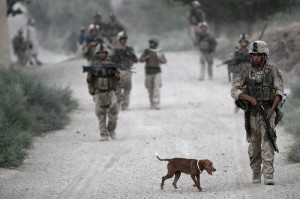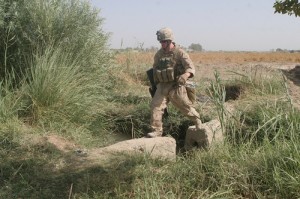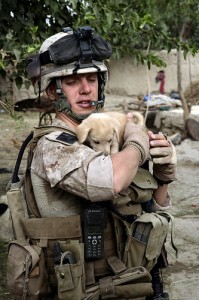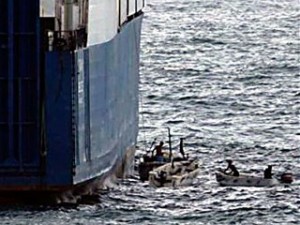Like many of you, I watched the 60 Minutes exposé on the special forces hunt for Osama bin Laden. My reaction was probably unlike most, but typical of the articles that frequent The Captain’s Journal. But more on my reactions in a moment. While we don’t normally interface with posts at other sites on a regular basis, this one is an exception that warrants special attention because of the salient points to be made on the campaign in Afghanistan. Christian at Defense Tech has an important post up on the whole sordid affair (you’ll see why it’s sordid momentarily).
So, after I posted the last thread, I went over to a forum that’s populated with no-joke special operations forces troops and looked at the discussion on the KBL/ Dalton Fury imbroglio. Man is it hot in there.
Apparently, Dalton Fury’s real name is Maj. Thomas Greer. I was wrong in thinking he was Pete Blaber, though it does turn out from the discussion that Blaber has a book of his own coming out called “The Mission, The Men, and Me: Lessons from a Former Delta Force Commander” that’s supposed to be available in December.
These operators at the forum are none too kind to a guy who’s attempting to “profit” from revealing covert operations covered under top secret non disclosure agreements. They skewer him and smoke his body over a pit of coals. But none of them disputes who he is, what he’s done or how the mission went down. There’s little comment about the actual 60 Minutes broadcast, though it would have been helpful if the reporters had mentioned the controversy Fury has caused and held fast on calling him by his real name (I did a search and his name comes up as a faculty member of American Military University). Once it’s out in the open, it looks a little ridiculous for a reputable news organization to stick to a pseudonym.
As a reporter who’s covered the military for a decade, I get a little annoyed at the knuckle-dragger attitude that someone who says anything about their covert activity should be banished. Give me a break. That attitude perpetuates an elitist, Samurai mentality that says “you don’t need to know. Just trust us, we know what we’re doing…”
Sorry, but I — and millions of other Americans — pay your salary and we damned right want to know what you’re doing. You work for us. So I’m glad, as long as it doesn’t deliberately put lives in danger of death (like the politically-motivated CIA tell-alls did back in the ’70s), that these stories come out. There’s been seven years between then and now, surely Delta and CIA have new ways of doing things that aren’t compromised by this book.
There is also a discussion thread at the Small Wars Journal in which it is concluded that this individual is the “real deal,” and it spends some time on the efforts at redaction that occurred between Greer and SOCOM. Good grief. Let’s go straight out of the gate and make our position clear. The Captain’s Journal doesn’t care who Greer is or if he is the “real deal” (any more than we care about the commenters at Defense Tech) except insofar as it goes to accuracy of his account and hence the ability to critique our strategy.
Further, the comment thread at Defense Tech is as brutal to Christian as the original one to which he points. I won’t waste time rehearsing it, but one particularly obnoxious example is this by someone with the pseudonym Krag (these people never use their real names):
Pathetic. You want to know…TS. Join an elite unit and then you’ll know. Otherwise, quit whining. The military doesn’t “work for” you or any other whining civvie. We work for the preservation of the Constitution. You pay taxes of which a small portion goes to pay for your collective defense…that entitles you to squat as to TTPs and classified information.
Get over yourself.
Congratulations Krag! Drop your dumbass pseudonym, tell The Captain’s Journal your real name and address, and we’ll send your B.A. degree in navel-gazing. But as for this elitist mentality and cloak-and-dagger secrecy, how do you say it in contemporary slang? The Captain’s Journal isn’t down with that.
If something is OPSEC, then it can’t be released. If it isn’t then it’s free game. Period. It shouldn’t be any more complex than that. TTPs can be OPSEC too, and the decision simply must be made as to whether the information is or isn’t OPSEC. Then we can move forward with the information, commentary and analysis.
Our position on special forces has been made clear before. We are a Marine blog. In the Marines, no one is special – or everyone is special, depending upon your perspective. Infantry is king, and every billet supports infantry. We are opposed to Recon being separated from the infantry unit they support. The Captain’s Journal supports the notion that special forces should be seen as specialized billets, not supermen who maintain a cloak-and-dagger secrecy, separated from the units they support.
On a related note, I could only chuckle when I recently watched the Navy SEALS (Military Channel) as they did their 6 mile run with a 50 lb. backpack, after which they qualified at 100 yards with a rifle (Marines qualify at 500 yards). In the Marines, a day that causes you to say “my life sucks” might include a 20 mile hump on a 100 degree F day with full body armor, backpack, SAW and three drums of ammunition, and hydration system (for a total of 120 pounds) followed by squad rushes for 1000 meters in the mud with live ammunition, followed by the Gunny telling you that the Lt. Col. has decided that we have two weeks to get everyone to the next belt in the MCMAP, so we get to “stay in the field, commune with nature and beat the hell out of each other for the next two weeks.” But I digress into the very thing with which I charge the “special” people.
Since we have now dispatched the juvenile navel-gazing and the “we’re so special, can’t you all see how we’re so special, tell us we’re special” mentality and can consider the things we learned on 60 Minutes (we didn’t learn much beyond what we already knew), our reaction was as our regular readers might imagine it to be. “There you have it in all its glory – the stupid Rumsfeld legacy.”
Air Force special operators with satellite uplinks guiding JDAMS to target, CIA operatives making shady deals with halfway reliable (or all the way unreliable) allies, Delta Force operators in the background, gizmos, gadgets and thingamajigs, tribal elements in the foreground, minute-by-minute radio communications on the whereabouts of UBL, and cloak-and-dagger secrecy after the fact … it all makes for interesting television, civilian amazement, and even more honest books about the abject failure of the Rumsfeld strategy in Afghanistan.
Marines are always in ready reserve, and if their forces needed supplementing, the 82nd or 101st Airborne should have been able to respond to the need of the moment. There is absolutely no replacement for infantry, and in this case, terrain control, interdiction and authority over transit was the solution to the problem. Infantry could have provided this, special forces could not. We let UBL escape, and it was not the fault of special forces. It was Rumsfeld’s fault. It was a strategic blunder.
It isn’t a reflection on their specialized billets, their capabilities or their commitment. It’s a function of force projection. Special forces cannot supply the force projection necessary to win counterinsurgencies. Only infantry can do this. This is what we learn when we put aside the sophomoric posturing over who’s special and who isn’t.








